The housing market in Georgia has been experiencing a steady rise in value since 2020, with median home prices reaching as high as $400,000 from the 2020 figure of $242,000. However, recent market conditions seem to have dampened demand for GA real estate. Will this dampening trend continue, or is the market setting itself up for a rebound?
At Defy Mortgage, we make the mortgage process as simple as possible for homebuyers, real estate investors, self-employed individuals, and business owners. We have expertise in 75+ non-traditional mortgage solutions, including DSCR loans, bank statement loans, and foreign national loans, with each option fully tailored to your unique situation.
In this article, we’ll answer your questions about whether Georgia’s housing market will cool down in 2025 and explain inventory, pricing, and buyer behavior to give you a potential outlook of investing or buying a house in Georgia.
Let’s dive in!
Current State of the Housing Market in Georgia in 2025
As of May 2025, the housing market in Georgia is experiencing stabilizing prices and softening demand. Following a period of increased competitiveness at the start of the decade, the market remains competitive, although some areas are starting to see more frequent price drops or longer time spent on the market.
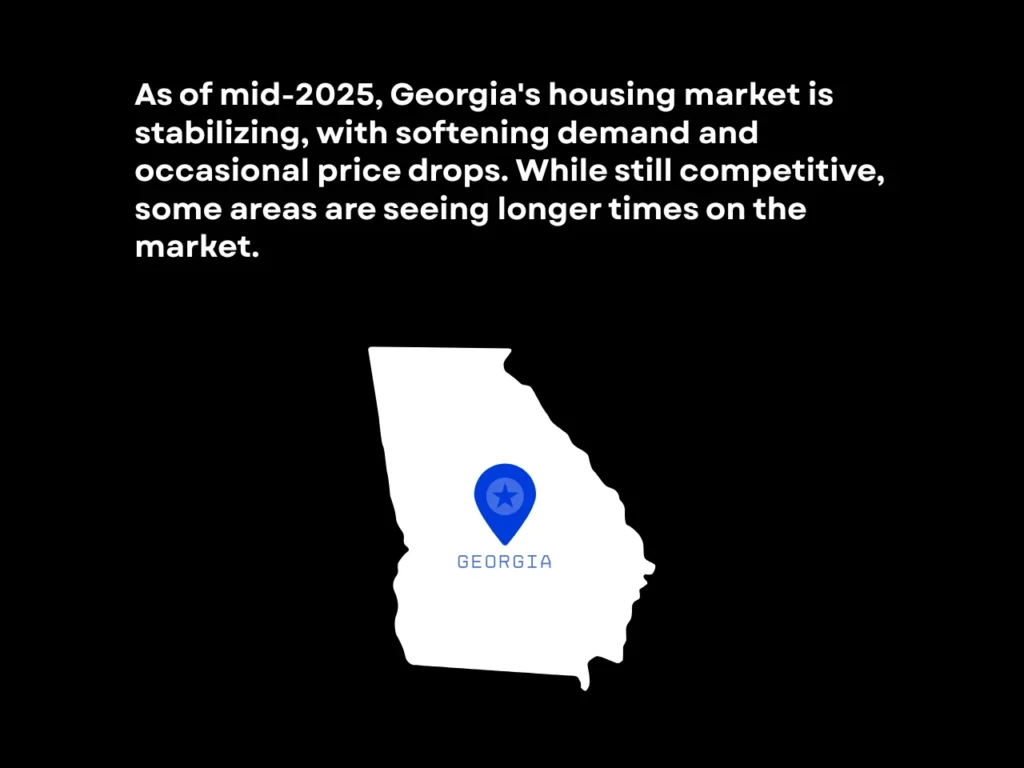
State of the Housing Market in Major Georgia Cities
Harry Norman Realtors forecasted a modest price growth of up to 3% across Georgia through the end of the year, but recent market shifts may complicate such predictions. The housing market in Georgia appears to vary significantly based on the region, with some prices accelerating faster than others.
Atlanta
Atlanta has recently shifted into a buyer’s market, with more homes selling with price drops and fewer homes selling above the list price. The median sale price for all home types, including townhouses and condos, has experienced an over 11% year-over-year drop from $419,000 in April 2024 to $375,000 in April 2025. Single-family homes experienced less of a drop, from $430,000 in February 2024 to $410,000 in February 2025 – a 4.7% decrease. However, the median sale price in April 2025 was a significant rise from the price in March, which was $365,000. This could indicate that demand is starting to pick back up.
Single-family homes are also starting to tick upward in price following their steep drop beginning in November 2024. However, inventory has been substantially boosted, up 41% year-over-year to 4,709 homes for sale. That said, demand seems to be keeping up, with time on market dropping steeply from its January 2025 high of 73 days to only 50 by March 2025.
Savannah
Savannah is more affordable than Atlanta, with a median sale price of around $350,000 for all home types as of February 2025. Savannah’s single-family homes, specifically, also sell for a median price of $350,000–$60,000 less than in Atlanta. Home prices in Savannah have also been on a general upward trend for the last five years, signaling sustainable appreciation.
Augusta
Augusta remains one of the most affordable areas in Georgia, with a median sale price of $299,000. Currently, more homes sell for above the list price than those with price drops. However, the number of homes selling below list price is increasing year over year, which may indicate that buyers are slowly gaining leverage.
Macon
More affordable even than Augusta, Macon homes, including single families, sell for a median price of $195,000 as of February 2025. According to Redfin, this is a year-over-year increase of 24.6%, indicating rapid appreciation. Homes in Macon are spending more time on market at 64 days as of February 2025, up from 46 in February 2024, with fewer and fewer selling above list price, indicating a buyer’s market.
What’s Fueling or Slowing Down Georgia’s Real Estate Activity?
The current state of the Georgia housing market can be attributed to several factors. Let’s explore some of the most significant ones:
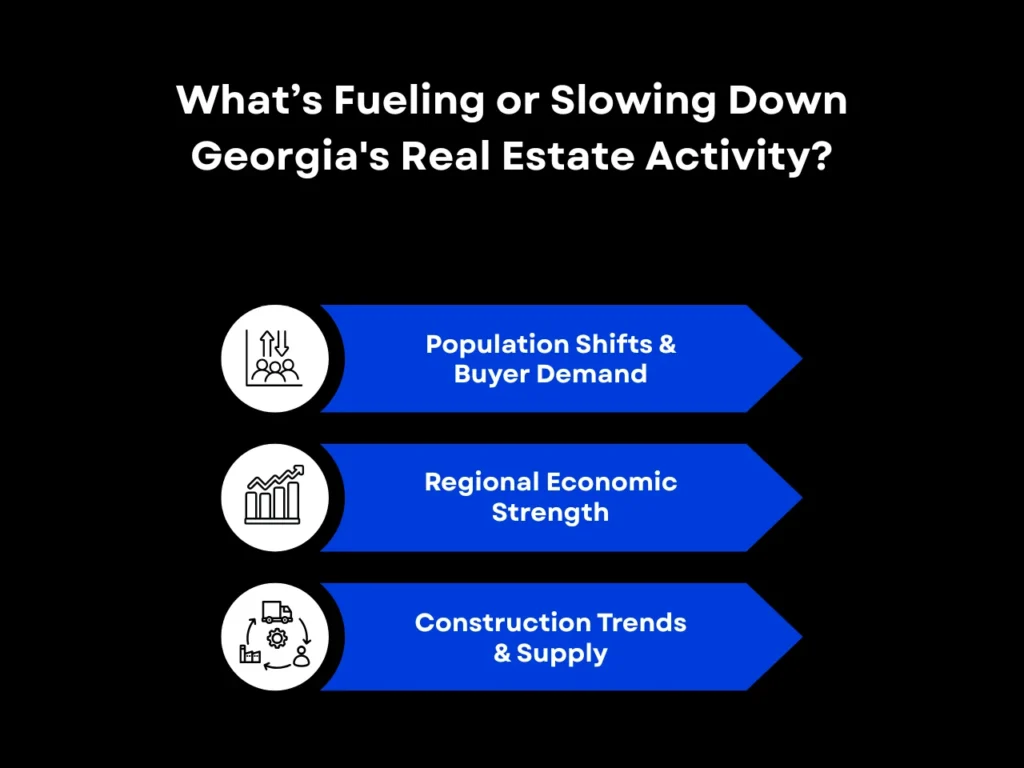
Population Shifts & Buyer Demand
Georgia continues to be a popular domestic migration destination, particularly from states with higher living costs such as Washington, California, New York, Illinois, and Florida. Between July 2023 and July 2024, Georgia added 116,646 new residents, most of which were due to international and domestic migration. Lower taxes and more affordable housing are the main factors driving buyer behavior.
Large urban markets such as Metro Atlanta remain highly popular, with the city’s population growing by 62,700 in 2024, bringing the total to 5.2 million. However, several up-and-coming cities are also getting recognized for their quality of life and affordability, such as Augusta, Roswell, and Athens.
Remote work also contributes to the upward trends. In a study for the Federal Reserve Bank of San Francisco, it was found that for every percentage-point increase in remote work, home prices rise by 1.5 percent. Remote workers make up over a quarter of the workforce in two of Georgia’s major cities: Sandy Springs and Atlanta.
Regional Economic Strength
Georgia’s core cities, such as Atlanta, Augusta, and Columbus, continue to experience accelerated job market growth. These cities have high concentrations of advanced tech and service-producing industries, including aerospace, automotive manufacturing, cybersecurity, distribution, and life sciences. Atlanta is currently considered one of the fastest-growing markets for life sciences, with a 20% job growth from 2019 to 2022, compared to the national average of 13.7%.
Georgia’s highly diverse economy gives its real estate market more resilience. A thriving job market attracts businesses and sustains healthy real estate appreciation. This is similar to San Diego, California, whose strong economy is supported by its military, biotech, and international trade sectors.
Inflation in Georgia has steadily dipped since its 2024 high of 4%, staying firmly at 3% as of May 2025. The University of Georgia Terry College of Business projects that inflation will not drop much lower than 3% for the rest of the year. Their report also states that Georgia’s economic growth will outpace that of the rest of the US in 2025, although unemployment is expected to rise slightly.
Construction Trends & Supply
Georgia saw the total number of housing units grow by 12.2% over the past decade – the 13th fastest growth in the US. However, despite more houses being put up for sale in GA every year, experts still consider the state to be in a housing shortage due to pent-up demand. Challenges such as labor shortages and increased material costs have also slowed the pace of new housing developments.
Signals to Watch If You’re Waiting to Buy or Invest
If you’re looking to enter the housing market in Georgia, staying informed about key market indicators can provide valuable insights into optimal timing and investment strategies. Here are the primary signals to monitor:
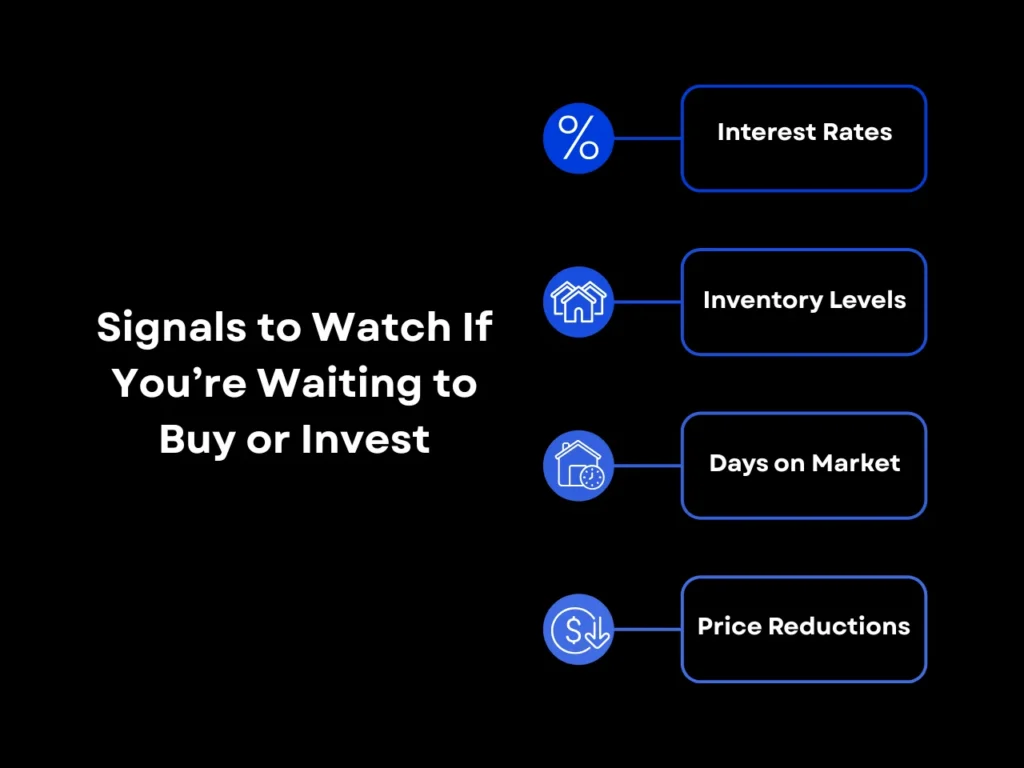
Interest Rates
Mortgage rates in Georgia for a 30-year fixed mortgage on a single-family home (assuming 720+ FICO score) are currently around 6.961% as of May 2025, slightly below the national average of 6.967%. Many experts agree that rate drops, if any, will contribute to the possibility of rates falling over the next two years.
Monitoring macroeconomic factors such as inflation, employment, stock market prices –and to a certain extent, Federal Reserve policies such as changes to the Federal funds rate–can give you vital clues as to the direction that mortgage rates can potentially go in the future. Some forecast an increased likelihood of a preemptive mortgage rate drop if the Federal Reserve hints at a Fed rate cut in June, similar to what happened in September of last year.
Inventory Levels
While inventory was tight in 2024, Georgia’s housing inventory has seen a notable increase of almost 15% year-over-year at 49,244 listings. Increases in inventory signal a potential shift to a buyer’s market as more options open up. However, keep in mind that prices tend to vary on a more local level, and regions with more housing construction are more likely to have potentially lower prices.
Although higher housing inventory is good for homebuyers, it can be detrimental to investors due to increased competition, both for flippers and rental owners. However, it may not directly affect those who favor long-term holding strategies, particularly in neighborhoods that are in higher demand. If you’re seeking high-value regions with limited supply, Defy offers options such as jumbo loans to secure such properties for long-term holding.
Days on Market
Median days on market for home listings across the state of Georgia currently sit at 71 as of February 2025, up from 51 days in 2024. This indicates that buyers are gaining more breathing room to make decisions.
For investors, longer time on market can indicate increased difficulty in selling a home, but if you’re a rental owner, it can be a sign that prospective homebuyers are starting to leave the market in favor of renting.
Price Reductions
Monitoring pricing fluctuations on listed properties is like monitoring the health of your local market. Price drops can imply that local buyers are gaining leverage, which means you may be able to close on a home for a more affordable price. Price hikes in the same neighborhood as your current investments, on the other hand, could indicate that profits are increasing for your current investment properties.
Periods of steady price decline followed by large price recoveries, for example, are advantageous for fix-and-flip strategies. Fix-and-flips involve purchasing an undervalued property, refurbishing it to be more appealing, and selling it at a profit. You can capitalize on price fluctuations by determining the optimal times for buying and selling.
Decreased home prices may benefit rental investors by providing a way to hedge against risk. As long as the rental demand remains high in an area, you are likely to earn the same amount of rental income even if the selling price decreases.
Loan Options for Buyers and Investors in Georgia
There are several loan options that stand out as excellent choices for both buyers and investors in Georgia’s housing market. Here’s a brief overview of each one:
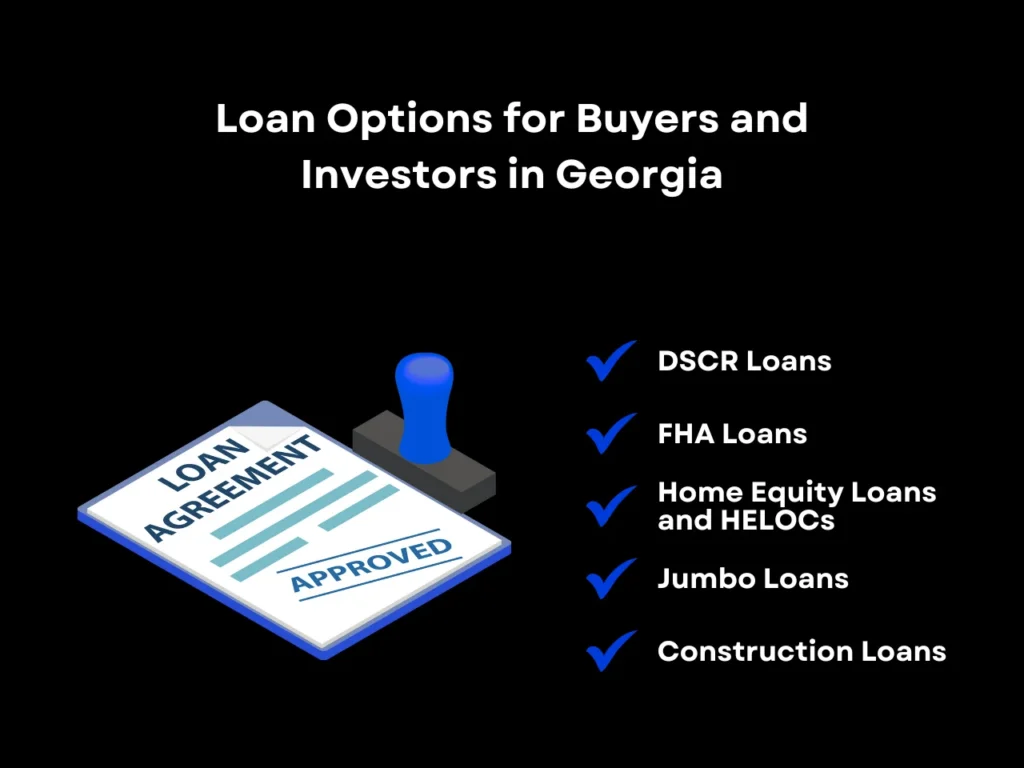
DSCR Loans
Debt Service Coverage Ratio (DSCR) loans are ideal for investors focusing on income-generating Georgia properties. DSCR loans let you qualify with your selected property’s income potential rather than provide comprehensive personal information such as W-2 income or tax returns. Defy Mortgage offers DSCR purchase loans and DSCR refinance, with interest-only options and availability to foreign nationals without a US-based SSN or FICO score as well. However, we currently do not offer DSCR construction loans.
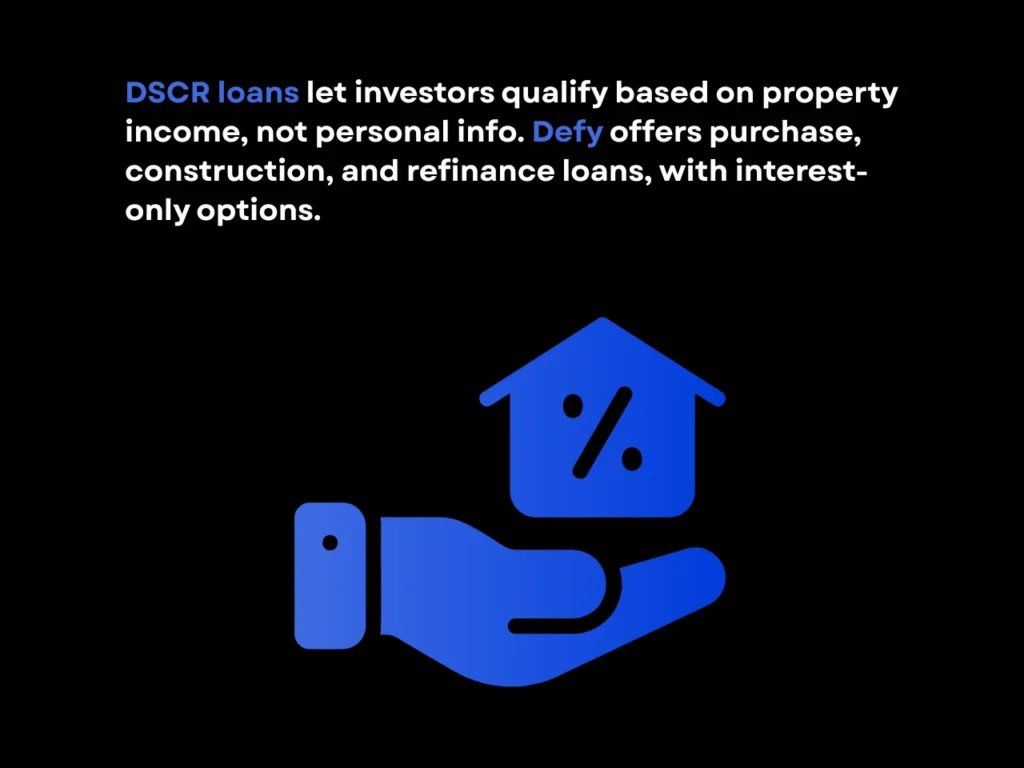
FHA Loans
Federal Housing Administration (FHA) loans are designed to help first-time homebuyers purchase homes. With advantages such as low down payment and better rates, FHA loans can make Georgia’s relatively inexpensive homes even more affordable. However, they require buyers to follow the FHA’s guidelines, such as a one-year occupancy requirement and minimum property standards.
Home Equity Loans and HELOCs
If you’re a homeowner or property owner with substantial home equity, you can potentially finance a home or investment purchase using a home equity loan or home equity line of credit (HELOC). Both are second mortgages that are based on how much equity you have on your home, with home equity loans providing you with a lump sum and HELOCs allowing you to withdraw funds as needed.
Jumbo Loans
Georgia has a growing luxury property market, supported by its robust economy and steadily increasing population. Lucrative holding prospects are appearing in areas like coastal Georgia and Buckhead, with prices exceeding conforming loan limits. In cases in which renting these properties out is unfeasible, or if you simply prefer not to do so, jumbo loans become necessary to sidestep the conforming loan limit restriction of conventional mortgages.
Bank Statement Loans
if you’re a self-employed individual, such as a freelancer, business owner, or 1099 contract worker, a bank statement loan is an alternative to traditional mortgage loans and offers more flexibility. Instead of W-2s, pay stubs, or tax returns, these loans allow borrowers to demonstrate their income using bank statements. For those with unconventional income streams, this can be a much more accurate way to represent their income than standard methods.
Housing Market in Georgia FAQ
Is Georgia’s housing market expected to drop significantly in 2025?
No, the Georgia housing market is expected to remain relatively stable; however, some parts are currently experiencing a cooling trend. That said, prices have yet to drop significantly, and demand is still sufficient to support high amounts of real estate activity. Whether this cooling effect will continue remains to be seen.
Which areas of Georgia are still experiencing price growth?
Most areas in Georgia are still experiencing home price growth. However certain places, such as Atlanta are currently in a period of home price decline, likely due to elevated mortgage rates and increased home prices. The National Association of Realtors considers Atlanta to be one of the cities that are most susceptible to price drops in 2025.
Does Defy offer DSCR or construction loans in Georgia?
No. Defy currently does not offer residential ground-up construction loans from primary residences, and we do not provide owner-builder loans for primary residences. This includes DSCR construction loans for properties intended to be rentals once completed. Defy Mortgage specializes in DSCR purchase loans and refinance for existing properties.
Can I use a HELOC in Georgia to finance a new property purchase?
Absolutely. As long as you have sufficient equity in your property to cover the amount you need, you can withdraw money from your home equity using a home equity line of credit (HELOC). HELOCs provide you with a set period during which you can withdraw money as-needed, so you can limit your debt obligation to the amount you’ve withdrawn, as opposed to a home equity loan which just gives you a lump sum at the time of closing. This makes them particularly suited to ongoing expenses, such as if you want to conduct home renovations as well as a home purchase.
What’s the best loan option for first-time buyers in Georgia through Defy?
The best loan option for you depends on your specific financial situation. If you’re a self-employed individual, it may be more beneficial to seek a bank statement loan in Georgia. You can also take advantage of FHA loan’s lower down payments. We are familiar with the market in Georgia and our exports can point you in the right direction for your unique situation.

Key Takeaway
While the 2025 housing market in Georgia is currently affected by the cooling of real estate across the United States as a whole, it’s showing remarkable resilience throughout the state. Many regions in the state still retain a steady growth rate, while cities such as Atlanta are presenting unique opportunities to buyers with a downturn in market activity.
If you’re waiting for the average home price in Georgia to fall before committing to a mortgage, keep in mind that prices are more likely to stabilize or even increase modestly throughout the year. It’s often a good idea to consult experts with access to Georgia MLS services to refine your property research.
Ready to explore your mortgage options in the Peach State? Defy Mortgage can assist you with custom-tailored mortgage solutions for your exact lending scenario. Whether you’re looking for DSCR, FHA, bank statement, jumbo, or HELOC, we can customize a loan option to address your needs.




